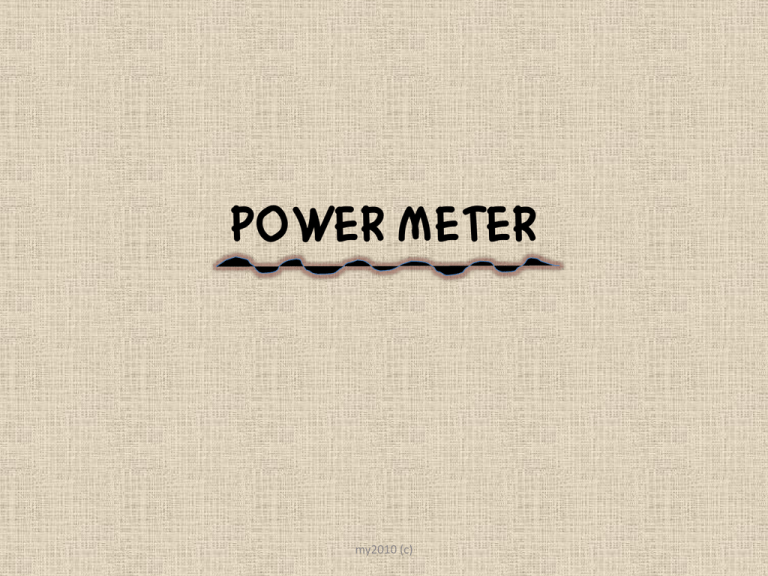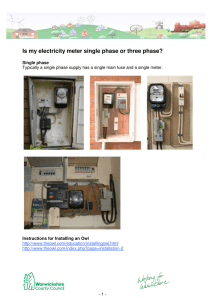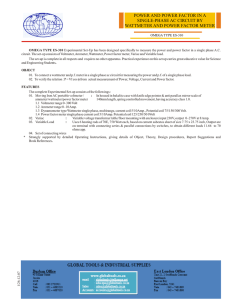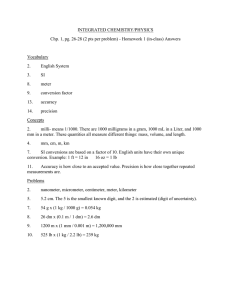POWER METER - WordPress.com
advertisement

POWER METER my2010 (c) ELECTRIC POWER Electric power is the rate at which electric energy is transferred by an electric circuit. The SI unit of power is the watt. When electric current flows in a circuit, it can transfer energy to do mechanical or thermodynamic work. Device convert electrical energy into many useful forms such as, heat (electric heaters), light (light bulbs), motion (electric motors), sound (loudspeaker), information technological processes (computer), or even chemical changes. my2010 (c) POWER METER A METER FOR MEASURING THE AMOUNT OF ELECTRIC POWER USED. SOME EXAMPLES OF POWER METER ARE: WATTMETER KWH METER my2010 (c) CLAMP METER WATTMETER SYMBOL OF ANALOGUE WATTMETER BASIC PRINCIPLE OF ANALOGUE WATTMETER A wattmeter has two coils that multiply volts times amps. P = IV Watt = Ampere x Volt One coil is wired as an ammeter with a shunt, the other as a voltmeter with a multiplier. my2010 (c) This instrument is of the electrodynamic type. It consist of a pair of fixed coils, known as Current coils and movable coil known as the potential coil. The voltage is measured across (parallel) the load and charges the pointer magnet. The current is measured in series with the load and charges the field magnets. The movable coil carries a needle which moves over a suitable marked scale. Spiral coil springs hold the needle to a zero position. Fig1: A simplified electrodynamic wattmeter circuit. my2010 (c) Wattmeter connection for power measurement. my2010 (c) A WATTMETER CONNECTED IN VARIOUS CIRCUITS. TWO-PHASE SYSTEM . my2010 (c) KWH METER An electric meter or energy meter is a device that measures the amount of electrical energy consumed by a residence, business, or an electrically powered device. Electric meters are typically calibrated in billing units, the most common one being the kilowatt hour. The most common type of electricity meter is the electromechanical induction watt-hour meter. my2010 (c) The electromechanical induction meter operates by counting the revolutions of an aluminium disc which is made to rotate at a speed proportional to the power. The metallic disc is acted upon by two coils. One coil is connected in such a way that is produces a magnetic flux in proportion to the voltage and the other produces a magnetic flux in proportion to the current. This produces eddy currents in the disc and the effect is such that a force is exerted on the disc. A permanent magnet exerts an opposing force proportional to the speed of rotation of the disc. The equilibrium between these two opposing forces results in the disc rotating at a speed proportional to the power being used. my2010 (c) EDDY CURRENT my2010 (c) Mechanism of electromechanical induction meter. 1 - Voltage coil - many turns of fine wire encased in plastic, connected in parallel with load. 2 - Current coil - three turns of thick wire, connected in series with load. 3 - Stator - concentrates and confines magnetic field. 4 - Aluminum rotor disc. 5 - rotor brake magnets. 6 - spindle with worm gear. 7 - display dials - note that the 1/10, 10 and 1000 dials rotate clockwise while the 1, 100 and 10000 dials rotate counter-clockwise. my2010 (c) CLAMP METER An electrical meter with integral AC current clamp. This allows properties of the electric current in the conductor to be measured, without having to make physical contact with it. Clamp meters are often sold with a device that is plugged in between the power outlet and the device to be tested. The device is essentially a short extension cord with the two conductors separated. my2010 (c) HOW TO USE CLAMP METER? In order to use a clamp meter, only one conductor is normally passed through the probe. If more than one conductor is passed through then the measurement would be the vector sum of the currents flowing in the conductors and would depend on the phase of the current. The reading produced by a conductor carrying a very low current can be increased by winding the conductor around the clamp several times; the meter reading divided by the number of turns is the current. my2010 (c) Cost of the power consumption. Calculate the cost of the power consumed by an electrical range that used 5A current on a 230-Volt line within 4 hours. The electricity tariff rate is 18cents per kilowatt hour. my2010 (c) P IV P(5A)(230V ) P 1150W KWh (1150W )(4h) 1000 KWh 4.6KWh Cost 4.6KWh RM 0.18 KWh RM 0.828 my2010 (c) Find the total power of the following appliances. -A toaster that draws a current of 5A on 115-volt line. -An electric range that uses a 5A current on a 230-volt line. - A heater that draws a current of 5A on 230-volt line within 2 hours. Then, calculate on how much the cost of the total power if the rate is 28cents per kilowatt hour. P = IV = 5A x 115 V = 575 w Kwh = 0.575kwh Cost = RM 0.28/kwh x 0.575kwh = RM 0.161 Total cost = RM0.161 + RM0.322 my2010 (c) = RM 0.483 P= IV = 5A x 230V = 1150 w kwh = 1.15kwh cost = RM 0.28/kwh x 1.150kw = RM 0.322 - A heater that draws a current of 5A on 230-volt line within 2 hours. Then, calculate on how much the cost of the power if the rate is 28cents per kilow hour. P = IV = 5A x 230V = 1150w Kwh = 1.15kwh x 2 = 2.3kwh Cost = RM 0.28/kwh x 2.3kwh = RM 0.644 my2010 (c)


